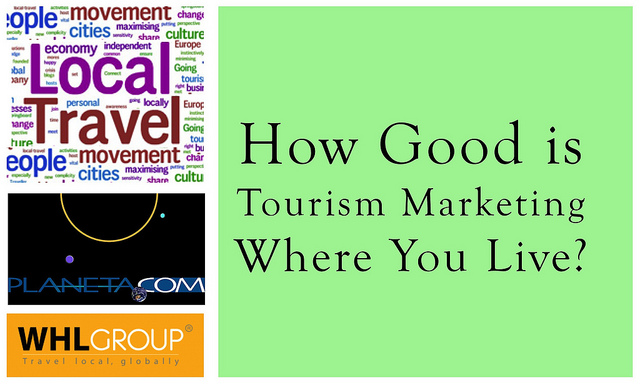Against all expectations in our constantly squabbling tourism industry, a sort of consensus seems to be emerging about how ably the majority of tourism marketing organisations are representing their clients: not really all that well, especially when it comes to today’s swiftly changing travel climate and to representing the interests of local communities and travellers keen on interacting with them.
What do you think? Do you agree/disagree? We’re running a short (eight-question) survey about it and are very eager for your opinion.
My Opinion
Personally, I have to agree, especially as I sit in a curious place, a busy information juncture fed by multiple data streams involving the active and growing local-travel segment of the industry.
Directly relevant to – but distressingly absent from – almost everything in which I am engaged are all of the special entities officially charged with promoting destinations, whether a town, city, region or country. These include destination management/marketing organisations (DMOs), convention and visitors bureaus (CVBs) and private public relations agencies.
Continue reading this article on The Travel Word blog and then participate in the survey


I’m not sure that I understand the logic in asking residents to judge the effectiveness of a DMO’s marketing efforts.
Posted by brent | September 11, 2012, 7:38 amHi Brent,
In my experience (and those of many others I know), locals are very proud of their home areas. They are usually its best ambassadors. This is true whether or not they’re involved in tourism. But how involved are they (or are they allowed to be) in how their home is promoted? Does anyone ever ask the locals what they want or is it always left to PR firms over whom the commercial tourism industry holds great sway?
For example, how many people who live in spring-break party destinations really like the holiday influx each year? From conversations I’ve had: not many. Especially if the locality has other gorgeous assets (like nature-based ones) that could maintain the area’s high profile but for more meaningful reasons.
Posted by Ethan Gelber | September 11, 2012, 4:40 pmHi Ethan,
While what you’ve said is absolutely true, but it is a bit subjective as well.
For instance, there are a number of local people in South Asia who would want nothing more than to have an influx of travelers which could potentially be a source of income for them – minimum wages and per capita incomes are not the same or given their due importance in this part of the world as compared to the west.
At the same time, these local people will get the opportunity to show the world the splendour and beauty of their regions/country.
What tourism and its marketing can do for them is potentially huge, and while it may develop into a spring-break destination like atmosphere in the longer run, that for the time being can also be considered as speculation at best. Most locals in my opinion have a high sense of responsibility and in some cases their respective governments back this up with apt regulations. Ex – Bhutan, where smoking is not permitted anywhere in the country, or the Indian state of Meghalaya where littering can lead to a heavy fine or even some jail time.
Posted by Arjun Sachdeva | January 31, 2014, 11:27 amI think Charleston, South Carolina does an excellent job of portraying the wide diversity of allure in the city – what it’s known for and what it’s becoming known for. Local business owners and local celebrities are often featured in Charleston destination marketing efforts. Definitely worth checking it out!
Posted by Clare | October 23, 2012, 10:13 pmToday is November 7. Happy Responsible Tourism Day! That said, I wonder how many local tourism entities are aware of the date or (more importantly) engage locals and visitors with ‘responsible travel’ options and education.
The results of our survey show a severe disconnect between those promoting tourism and those who they supposedly serve. This is a problem easily solved with improved communication and dialogue.
The results of our survey are online
http://www.slideshare.net/planeta/marketinglocal
Posted by Ron Mader | November 7, 2012, 1:09 pmNepal also celebrate responsible tourism day, It is very important to be responsible nature. Nepal has so many natural beautiful god gift which we are preserving till this movement.
Posted by Deepak Khanal | May 30, 2013, 5:19 amI’m extremely proud of the work Tourism Vancouver does to promote the diversity of our city. We’ve been working with their media relations department for a couple years, and can attest to the fact that they routinely promote sustainable, local experiences: local guides, independent hotels and restaurants, and BC’s cultural diversity. I expect they stand head and shoulders above the majority of tourism marketing organizations.
Posted by Sara Cooke | January 7, 2014, 7:22 pm